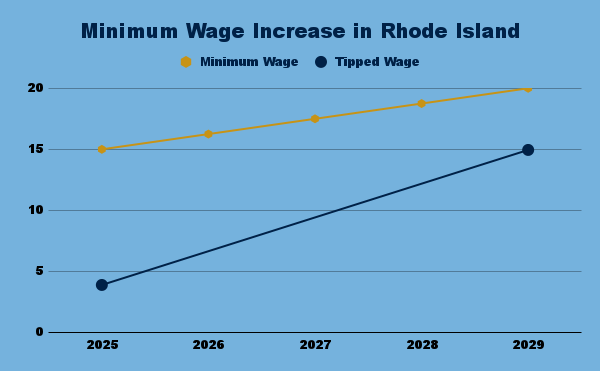The Rhode Island Senate Committee proposed phasing out the tipped wage and increasing the state minimum wage on March 24, sparking deliberation on tipping culture and restaurant funding.
Sponsored by legislators such as Reps. Karen Alzate and Joseph McNamara, the bill would gradually increase overall wage for employees “receiving gratuities,” or those reliant on tips to make minimum wage.
The Committee also proposed a wage bill to increase the state minimum wage by $1.25 each year from 2026 to 2029, until it reaches $20.
Servers and bartenders, who receive a tipped wage, make $3.89 per hour. This bill seeks to increase that baseline wage yearly, until reaching $14.95 in 2029. By 2030, the base tipped wage would be equal to the established minimum wage, $15.
“Others have attempted this policy change [to phase out tipped wages] and it backfired,” said Christopher Carlozzi, Rhode Island Director of National Federation of Independent Business.
Carlozzi said that Maine was set to phase out the tipped minimum wage after a ballot referendum, or citizen-initiated law. The law promised to raise the state’s tipped wage from $3.75 per hour in 2016 to $12 in 2024, according to an article by The Washington Post . However, Maine reversed it soon after.
“It wasn’t because of employers, it was because of servers experiencing a reduction in pay,” Carlozzi said. “Tips decreased and servers showed up with full force at the [Maine] State House demanding the tipped wage be reinstated.”
Also against the proposal, Rep. Arthur Corvese said tipping is about service.
When restaurant customers receive good service, they tip accordingly, Corvese said. Then those same customers return, hoping for the same server and service they appreciate.
“This is about being able to serve,” Corvese said. “This is an occupation for people that enjoy it. And if somebody doesn’t do well in this industry, there’s a problem elsewhere. Either they’re not that good of a server or they’re not that likable.”
Alan Krinsky, representing the Economic Progress Institute, said that tipping is about more than service, and “has its very history in slavery.”
In his written statement where he cited a New York Times article entitled “Tipping Is a Legacy of Slavery ,” Krinsky said once slavery ended, tipped wages became a way for employers to avoid paying formerly enslaved people the minimum wage.
On May 8, 1938, when the minimum wage was first signed into law, it excluded professions where the majority of employees were minorities and women, Krinsky said.
Servers go into work making less than minimum wage, and rely on the goodwill and compassion of strangers to make ends meet, Krinsky said. This creates a system that relies on more than how good their service is.
Today, 70% of tipped workers are women, and 43% are people of color, Krinsky said. Of these percentages, white workers are more likely to secure jobs in “fine-dining” establishments and be tipped at a higher rate.
“The activity [of tipping] is more to encourage women to, you know, dress differently,” Krinsky said.
Hoping to decrease wage disparities and increase equity in the food and restaurant industry, Krinsky believes that phasing the tipped minimum wage over time will make servers’ paychecks not reliant on race or gender performance.
“I don’t think that this policy that was created almost a century ago and was based in sexual and racial discrimination, is something that we would adopt today,” Krinsky said. “I’m not sure why we should continue it.”
The Committee also introduced discussion about an increased minimum wage, which has the potential to raise the number gradually until it hits $20 per hour in 2029.
Introduced by representatives, including David Morales and Brandon Voas, the bill seeks to change the rate at which the minimum wage increases. As of 2024 it increases by $1 per year.
The current minimum wage in Rhode Island is $14/hour, which, Carlozzi said, we have not yet seen the effects of. However, with a $20/hour minimum wage, he predicted an increase in employee lay-offs as businesses struggle to find the funds.
Carlozzi used California’s fast food chains as an example of increased lay-offs, and said that pizzarias cut jobs and reduced employee hours in response to a minimum wage increase to $20/hour on March 25.
Employees will also face impacts of the proposed legislation, Carlozzi said. With less employees and higher wages comes a decline in service and higher menu prices.
The House Labor Committee did not make a decision during this general assembly, and is holding both wage bills for further deliberation.

